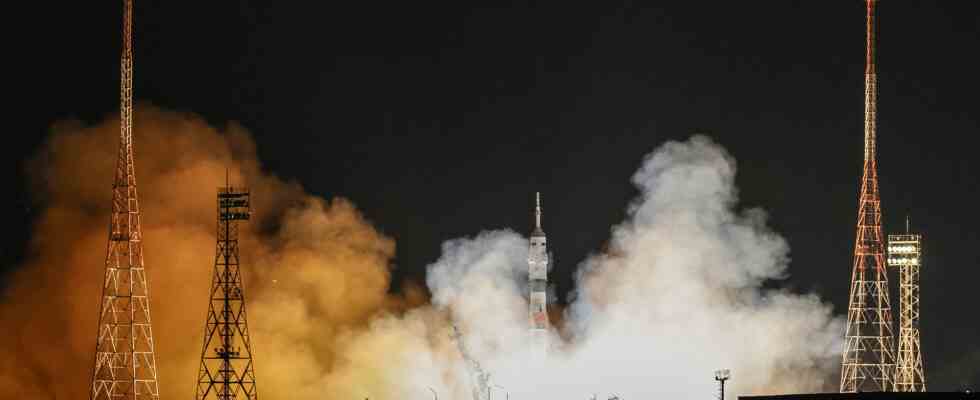Status: 02/24/2023 3:38 p.m
In mid-December, astronauts on the ISS discovered a leak on their return flight rocket – they have been stuck ever since. An unmanned Russian Soyuz capsule has now launched ahead of schedule to the space station to bring it back to Earth.
An unmanned Soyuz rocket has launched a return mission to the International Space Station. The Soyuz MS-23 took off from the Baikonur Cosmodrome in Kazakhstan on Friday morning, live footage from the US space agency NASA showed. The spacecraft is scheduled to dock with the ISS on Sunday and return three astronauts stuck on the space station to Earth in September.
The launch and swing into orbit of the spacecraft were “normal”, said the Russian space agency Roskosmos. Docking with the ISS is therefore scheduled for February 26 at 01:01 GMT (02:01 CET).
Soyuz MS-23 was originally scheduled to take off in March
The US astronaut Frank Rubio and the two Russian cosmonauts Sergei Prokopjew and Dmitri Petelin were originally supposed to fly back to Earth in the Soyuz MS-22 space capsule at the end of March. This was apparently damaged by a small meteorite in mid-December, which caused a leak in the spacecraft’s cooling system. The mission of the three astronauts was extended by six months because of the breakdown. The Soyuz MS-23 space capsule was not supposed to start until mid-March with three successors for Rubio, Propkolew and Petelin on board to the ISS. Due to the damage to the MS-22 capsule, however, the launch was brought forward and was now carried out without a crew.
The astronaut and the two cosmonauts are now spending almost a year on the space station. The capsules typically remain docked at the station for the entire duration of the crew’s exploration mission, in order to be able to return astronauts to Earth in the event of emergencies.
In addition to the three crew members affected, there are four other people on board the ISS: the Russian Anna Kikina, the US astronaut Nicole Mann and her compatriot Josh Cassada, and the Japanese Koichi Wakata. They flew into space as part of the so-called Crew 5 mission in October on board a space capsule belonging to the US space company SpaceX, owned by multi-billionaire Elon Musk.
Next week, the four participants of the subsequent Crew 6 mission – two US citizens, one Emirati and one Russian – are to be added. They are also said to be arriving on a SpaceX capsule, which is scheduled to launch from Florida on Monday. After a “handover” lasting several days, the Crew 5 astronauts should then return to Earth.
Glimmer of hope for rapprochement?
The German astronaut Reinhold Ewald did not want to call the current Soyuz mission a “rescue mission”. “The crew isn’t stranded somewhere. Even if many systems fail, there are ways and means on the Soyuz to steer the capsule home.” In a way, the problems on earth are bigger than in space. “It’s a lot of work for Russian space travel. The Soyuz, which is being sent up unmanned, was intended for a crew. That’s already a significant disruption to the order. Russia doesn’t produce them in stock,” said the 66-year-old.
Ewald, who flew to the Russian space station “Mir” in a Soyuz capsule in 1997 and did research for three weeks, pointed to the pragmatic ongoing cooperation between NASA and Roscosmos despite the Ukraine war: “The situation is bad enough. That’s it maybe a glimmer of hope that we’re getting closer.” He does not believe that Russia will exit the ISS program any time soon. “Moscow just recently sent up a science module. I think Russia will use its investment in the station for as long as possible.”
Since the start of the Russian offensive in Ukraine a year ago, space has been one of the few areas where Russia and the US are still cooperating. The ISS has been in operation since 1998.

